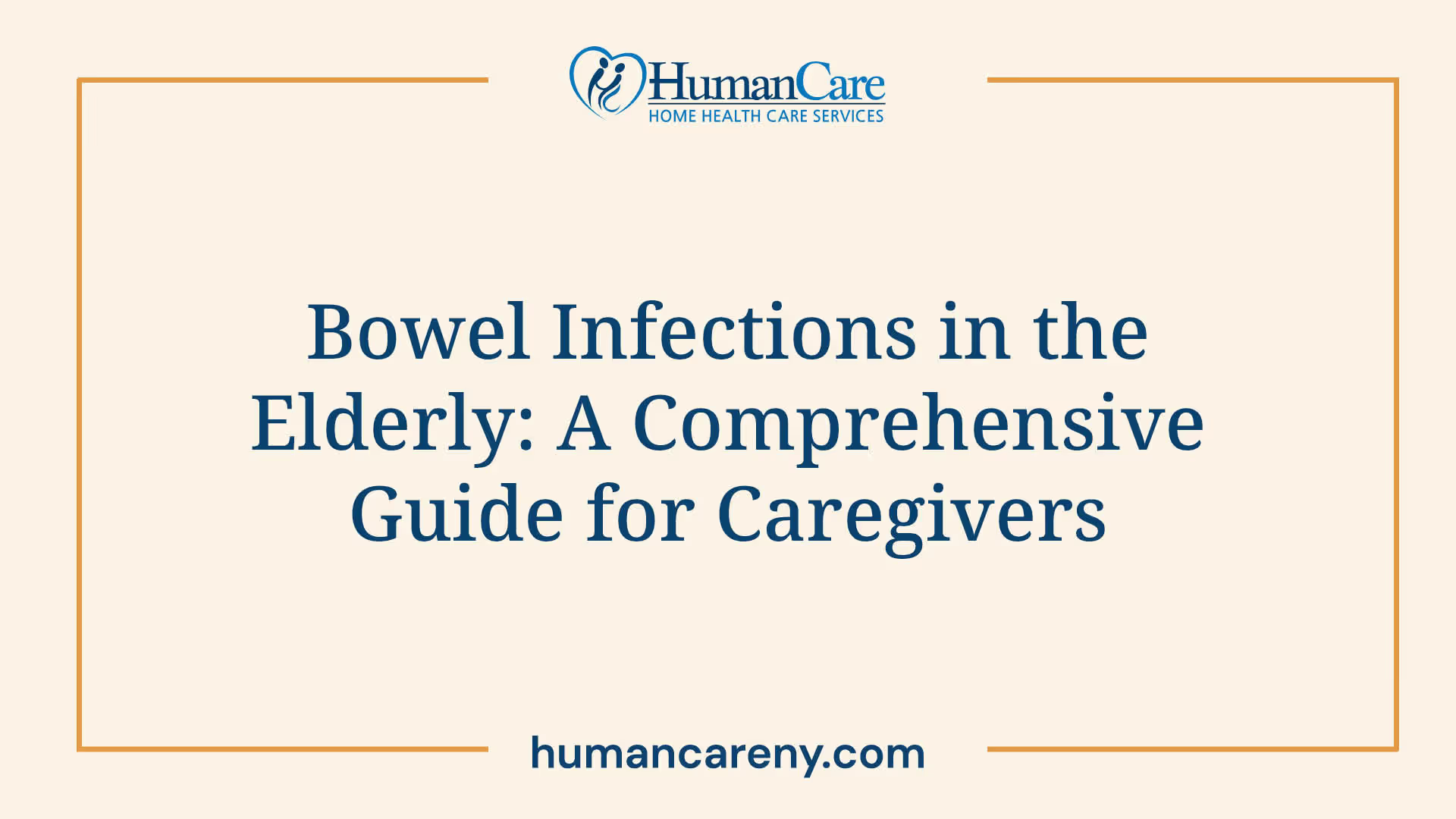Bowel Infections in the Elderly: A Comprehensive Guide for Caregivers
Comprehensive guide for caregivers on bowel infections in the elderly. Learn symptoms, prevention, and treatment for bowel infections in older adults.

Understanding Bowel Infections in the Elderly
When it comes to the elderly population, bowel infections are a significant health concern with potentially serious consequences. It is important for caregivers and healthcare professionals to have a comprehensive understanding of these infections. In this section, we will provide an overview of bowel infections and discuss the impact of age on their occurrence.

Overview of Bowel Infections
Bowel Infections, also known as Gastrointestinal Infections or Gastroenteritis, refer to the inflammation of the digestive tract caused by infectious agents such as bacteria, viruses, or parasites. These infections can lead to symptoms like diarrhea, abdominal pain, nausea, and vomiting.
In the elderly, bowel infections are a common and serious health issue. Compared to younger individuals, the elderly have a higher risk of complications and mortality associated with these infections. The weakened immune system and age-related changes in the digestive system contribute to this increased vulnerability.
Impact of Age on Bowel Infections
Age-related changes in the digestive system can make the elderly more susceptible to bowel infections. The gastrointestinal function may be compromised, resulting in reduced motility and slower digestion. This can create an environment where infectious agents can thrive and cause infections.
Furthermore, the elderly often have weakened immune systems, making it more challenging for their bodies to fight off infections. Chronic health conditions, such as diabetes or kidney disease, can further compromise the immune system and increase the risk of bowel infections.
The use of certain medications, such as immunosuppressants or proton pump inhibitors, can also contribute to an increased susceptibility to bowel infections in the elderly. It is crucial for caregivers and healthcare providers to be aware of these risk factors and take appropriate preventive measures.
Understanding the specific challenges and risks associated with bowel infections in the elderly is essential for effective prevention, diagnosis, and treatment. By addressing these factors, caregivers can help minimize the impact of bowel infections on the well-being and quality of life of elderly individuals.
Symptoms and Risk Factors
Bowel infections in the elderly can have significant implications for their health and well-being. It is important for caregivers to recognize the symptoms and understand the risk factors associated with these infections to ensure timely intervention and appropriate care.
Recognizing Symptoms in the Elderly
Symptoms of bowel infections in the elderly can often be subtle and easily overlooked. It is crucial for caregivers to be vigilant and aware of any changes in the individual's health. Common symptoms to watch for include:
- Changes in Bowel Movements: Elderly individuals may experience diarrhea or constipation, or alternating episodes of both. These changes in bowel habits can be indicative of a bowel infection.
- Abdominal Pain: Pain or discomfort in the abdominal region can occur with bowel infections. The pain may be mild or severe and can be accompanied by bloating or cramping.
- Fatigue: Elderly individuals with bowel infections may feel unusually tired or experience a lack of energy.
It is important to note that these symptoms can also be associated with other health conditions. If any of these symptoms persist or worsen, it is recommended to seek medical attention for proper evaluation and diagnosis.
Risk Factors for Bowel Infections in the Elderly
Several risk factors contribute to the susceptibility of elderly individuals to bowel infections. These risk factors include:
- Weakened Immune Systems: Aging is associated with a natural decline in immune function, making the elderly more vulnerable to infections, including bowel infections.
- Chronic Conditions: The presence of chronic conditions such as diabetes, kidney disease, or inflammatory bowel disease (IBD) can weaken the immune system and increase the risk of bowel infections.
- Medications: Certain medications, such as immunosuppressants or antibiotics, can disrupt the normal balance of bacteria in the gut, making the elderly more susceptible to bowel infections.
- Institutional Settings: Elderly individuals residing in long-term care facilities or hospitals are at higher risk due to close proximity to others and potential exposure to infectious agents.
Understanding these risk factors can help caregivers take necessary precautions and seek prompt medical attention when needed. By being aware of the symptoms and risk factors, caregivers can play a vital role in the early detection and management of bowel infections in the elderly.
Prevention and Hygiene Practices
Preventing bowel infections in the elderly is of utmost importance to maintain their overall health and well-being. By implementing proper hygiene practices and taking preventive measures, caregivers can significantly reduce the risk of bowel infections in this vulnerable population.
Importance of Hygiene in Bowel Infection Prevention
Maintaining good hygiene is crucial in preventing bowel infections in the elderly. Proper hygiene practices help reduce the transmission of harmful bacteria and viruses that can lead to infections. By following strict hygiene protocols, caregivers can create a safe and clean environment for their elderly loved ones.
One of the primary preventive measures is regular and thorough hand hygiene. Caregivers should wash their hands with soap and water for at least 20 seconds before and after providing care, handling food, or using the bathroom. Alcohol-based hand sanitizers can be used as an alternative when soap and water are not readily available. Hand hygiene is essential in preventing the spread of pathogens that can cause bowel infections.
Preventive Measures for the Elderly
In addition to maintaining good hygiene practices, there are several other preventive measures that caregivers can take to reduce the risk of bowel infections in the elderly.
- Cleanliness in Living Spaces: Regular cleaning and disinfection of commonly touched surfaces, such as doorknobs, countertops, and bathroom fixtures, can help eliminate bacteria and viruses. Paying special attention to bathroom cleanliness is essential since bowel infections can often be caused by fecal-oral transmission.
- Safe Food Handling and Preparation: Proper food handling and preparation are crucial in preventing foodborne bowel infections. Caregivers should ensure that food is cooked thoroughly, stored at appropriate temperatures, and that cross-contamination is avoided. Encourage elderly individuals to consume a balanced diet and stay hydrated, as proper nutrition and hydration support a healthy immune system.
- Avoiding Contact with Infectious Individuals: Encourage the elderly to avoid close contact with individuals who have infectious diarrhea or gastrointestinal symptoms. Bowel infections can be highly contagious, and close contact with infected individuals can increase the risk of transmission.
By implementing these preventive measures, caregivers can create a safe environment and reduce the risk of bowel infections in the elderly. However, it's important to consult healthcare professionals for personalized advice and guidance on specific preventive measures based on the individual's health condition and risk factors.
Remember, prevention is key when it comes to bowel infections, and by prioritizing hygiene and taking necessary precautions, caregivers can help safeguard the health and well-being of the elderly population.
Diagnosis and Treatment
When it comes to bowel infections in the elderly, prompt medical intervention is crucial. Seeking timely medical attention is important to prevent the spread of infection, manage symptoms, and avoid potential complications.
Prompt Medical Intervention
Recognizing the signs and symptoms of bowel infections in the elderly is essential for timely intervention. Caregivers and family members should be vigilant in observing any changes in bowel habits, abdominal pain, diarrhea, vomiting, or fever. If these symptoms are present, it is important to seek medical advice promptly to determine the underlying cause and receive appropriate treatment.
Treatment Approaches for Bowel Infections in the Elderly
The treatment of bowel infections in the elderly may involve a combination of approaches to effectively manage the infection and support recovery. Treatment options commonly include:
- Antibiotics: Depending on the specific type of infection diagnosed, antibiotics may be prescribed by a healthcare professional. It is crucial to take the prescribed antibiotics as directed and complete the full course of treatment to ensure effective eradication of the infectio.
- Hydration: Adequate hydration is important for elderly individuals with bowel infections. It helps to replace lost fluids and electrolytes due to diarrhea or vomiting. Encouraging the consumption of water, clear fluids, and oral rehydration solutions can help maintain hydration levels[.
- Supportive Care: Providing supportive care is essential to alleviate symptoms and promote comfort during the recovery process. This may include measures such as rest, dietary modifications, and over-the-counter medications to manage symptoms such as pain or fever. It is important to consult with a healthcare professional before administering any medications to ensure they are appropriate for the individual's specific condition[1].
It is worth noting that treatment approaches may vary depending on the severity of the infection, the individual's overall health, and the specific recommendations of the healthcare provider. Caregivers should follow the guidance of healthcare professionals and ensure proper communication and follow-up regarding the elderly person's progress.
By seeking prompt medical intervention and following the prescribed treatment approaches, bowel infections in the elderly can be effectively managed, reducing the risk of complications and promoting a speedy recovery.
Bowel Infections in Elderly IBD Patients
Inflammatory Bowel Disease (IBD) affects individuals of all ages, including the elderly population. Understanding the unique challenges and considerations for elderly IBD patients is crucial for effective management and care. In this section, we will explore the incidence and prevalence of IBD in the elderly, as well as the challenges faced in managing this condition in older patients.
Incidence and Prevalence of IBD in the Elderly
The incidence and prevalence of IBD, including conditions like Crohn's disease and ulcerative colitis, are increasing globally. With an aging population, the number of older patients with IBD is also expected to rise. While data specific to elderly IBD patients is relatively limited, it is important to recognize that clinical features and therapeutic options in this population may differ from younger patients.
Age-specific concerns play a significant role in the management of IBD in the elderly. Co-morbidities, loco-motor and cognitive function, polypharmacy, and its consequences need to be taken into account when developing treatment plans. Clinical decisions in elderly IBD patients can be challenging due to the lack of specific evidence-based guidelines for this population. Further research and clinical trials are necessary to provide clinicians with the necessary tools for making informed decisions regarding elderly IBD patients.
Challenges in Managing IBD in the Elderly
Elderly patients with IBD often require more frequent hospitalization compared to younger patients. They also have higher medical needs, including malnutrition, anemia, and hypovolemia. Hospitalization and surgery contribute significantly to healthcare spending associated with IBD, with increased age being an independent risk factor for hospital fatality in elderly IBD patients.
Thrombotic complications are more common in elderly IBD patients, potentially due to disease-related hypercoagulability, reduced mobility, and dehydration, which are more prevalent in the elderly population. Elderly patients with ulcerative colitis have the highest rates of venous thromboembolism, with a significant proportion experiencing venous thrombotic complications during hospitalization.
Diagnosing IBD in elderly patients can be challenging, as there are several conditions that can be confused with IBD, such as complicated diverticular disease, ischemic colitis, medication-associated diarrhea, infectious diarrhea, radiation colopathy, and microscopic colitis. Misdiagnosis may occur in a substantial number of elderly patients with IBD, leading to delayed diagnosis.
Treatment considerations for elderly IBD patients involve careful evaluation of risks and benefits. The use of immunosuppressive medication in this population increases the risk of opportunistic infections and potentially malignancy. Elderly patients are often excluded from therapeutic trials, resulting in a lack of data on drug efficacy in older patients. Additionally, polypharmacy, which is common in the elderly population, must be taken into account when selecting drug therapy for IBD[4].
Managing bowel infections in elderly IBD patients requires a comprehensive and individualized approach, considering the unique characteristics and challenges faced by this population. Collaborative efforts between healthcare providers, caregivers, and the elderly patients themselves are essential to optimize treatment outcomes and improve the quality of life for those living with IBD.
Age-Specific Considerations
When it comes to bowel infections in the elderly, there are unique factors that must be taken into consideration. Elderly individuals may experience different symptoms and challenges compared to younger adults. Additionally, elderly patients with inflammatory bowel disease (IBD) require specific treatment considerations. Let's explore these age-specific considerations in more detail.
Unique Factors in Bowel Infections in the Elderly
Elderly patients with bowel infections, including those with IBD, may present with symptoms that are different from younger individuals. According toNCBI, conditions commonly confused with IBD in the elderly include complicated diverticular disease, ischemic colitis, medication-associated diarrhea, infectious diarrhea, radiation colopathy, and microscopic colitis. Misdiagnosis may occur in up to 60% of elderly patients, leading to a delay in diagnosis of up to 6 years. This highlights the importance of thorough evaluation and consideration of alternative diagnoses in the elderly population.
It's worth noting that age-related factors can also contribute to the complexity of bowel infections in the elderly. Elderly patients may have co-morbidities, reduced loco-motor and cognitive function, and a higher prevalence of polypharmacy, which can impact the overall management of bowel infections. These factors should be taken into account when designing treatment plans for elderly patients with bowel infections.
Treatment Considerations for Elderly Patients with IBD
Elderly patients with IBD face unique challenges that require specific treatment considerations. According to NCBI, elderly patients with IBD tend to be hospitalized more often than younger patients and have higher medical needs, including malnutrition, anemia, and hypovolemia. Increased age is also an independent risk factor for hospital fatality in elderly IBD patients.
Treatment paradigms for IBD in the elderly are generally similar to those in younger patients, but with important considerations. It's important to note that elderly-onset IBD is usually not associated with disease progression. However, treatment with immunosuppressive medication in elderly patients increases the risk of opportunistic infection and possibly malignancy. Additionally, polypharmacy, which is common in elderly patients, must be taken into account when choosing drug therapy. The potential interactions between multiple medications can impact treatment adherence and outcomes.
To optimize treatment for elderly patients with IBD, a comprehensive approach that considers the individual's overall health, co-morbidities, and medication regimens is necessary. Close monitoring, regular follow-up, and coordination between healthcare providers are crucial to ensure the best outcomes for elderly patients with IBD.
By understanding the unique factors and treatment considerations for bowel infections, particularly in the elderly population, caregivers and healthcare providers can provide tailored care and support to this vulnerable group of individuals.
Immune Function and Aging
As individuals age, their immune system undergoes changes that can impact its ability to defend against infections. Understanding the impact of aging on the immune system is crucial when considering bowel infections in the elderly. Additionally, nutritional considerations play a significant role in maintaining optimal immune function in older adults.
Impact of Aging on the Immune System
The advanced age of individuals can modify the frequency and severity of infections, making them more susceptible to bowel infections. Immunosenescence, the decline in immune function associated with aging, can lead to reduced immune responses and an increased risk of infections in the elderly.
Several factors contribute to the impact of aging on the immune system. The production of pro-inflammatory cytokines declines, and there is a reduction in immunoglobulins, which are essential for immune defense. Malnutrition can further accentuate the decline in immune function, making proper nutrition crucial for maintaining immune health in older adults.
Nutritional Considerations for Elderly Immune Function
Optimal nutrition plays a vital role in supporting immune function in the elderly. Adequate intake of essential nutrients, vitamins, and minerals is necessary for maintaining a healthy immune system and reducing the risk of infections.
Here are some key nutritional considerations for supporting immune function in the elderly:
- Protein: Protein is essential for immune system maintenance and repair. Older adults should aim to consume an adequate amount of high-quality protein sources, such as lean meats, poultry, fish, beans, and dairy products.
- Vitamin C: Vitamin C is known for its immune-boosting properties. Elderly individuals should include fruits and vegetables rich in vitamin C, such as citrus fruits, berries, broccoli, and bell peppers, in their diet.
- Vitamin D: Vitamin D plays a crucial role in immune function. Older adults may have reduced sun exposure, which can lead to vitamin D deficiency. It is important to consider vitamin D supplementation or include dietary sources like fatty fish, fortified dairy products, and egg yolks.
- Zinc: Zinc is involved in various immune processes. Older adults should consume zinc-rich foods, including seafood, lean meats, whole grains, legumes, and nuts.
- Probiotics: Probiotics, found in fermented foods like yogurt and kimchi, can help support a healthy gut microbiome, which plays a role in immune function.
Maintaining a well-balanced diet that includes a variety of nutrient-dense foods is crucial for supporting immune function in the elderly. It is advisable to consult with a healthcare professional or registered dietitian for personalized nutrition recommendations based on individual needs and health conditions.
By understanding the impact of aging on the immune system and implementing proper nutritional strategies, caregivers can help support the immune health of elderly individuals and reduce the risk of bowel infections.
Conclusion
In conclusion, bowel infections in the elderly population require a comprehensive and individualized approach to diagnosis and treatment. With unique factors such as age-related changes in immune function, malnutrition, co-morbidities, and polypharmacy, healthcare providers must consider various factors when designing care plans for elderly patients with IBD.
By understanding the specific challenges faced by this population and implementing appropriate interventions, caregivers can help improve the quality of life for those living with bowel infections. Further research is necessary to provide evidence-based guidelines for managing this vulnerable population and optimizing treatment outcomes.
Sources
- https://helpandcomfort.com/bowel-infections-in-the-elderly/
- https://freedomcare.com/bowel-infections-in-the-elderly/
- https://healthcreeds.com/bowel-infections-in-the-elderly/
- https://www.ncbi.nlm.nih.gov/pmc/articles/PMC4734955/
- https://www.ncbi.nlm.nih.gov/pmc/articles/PMC6593279/




























































































